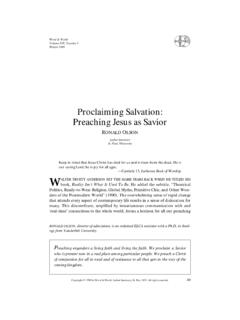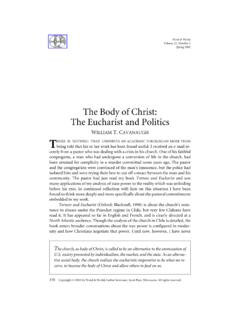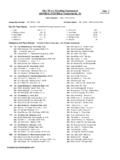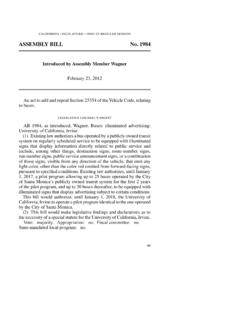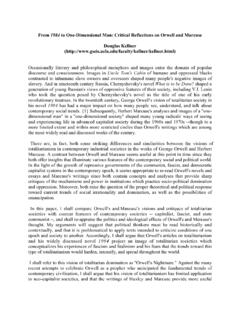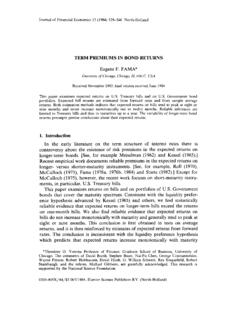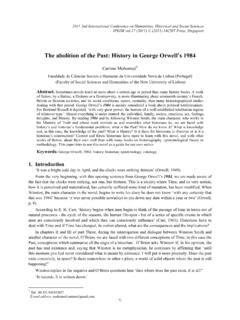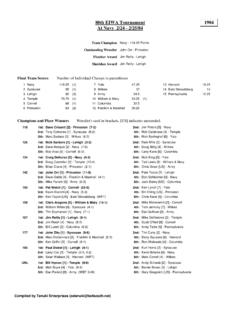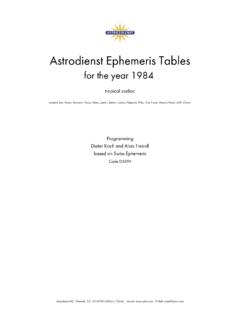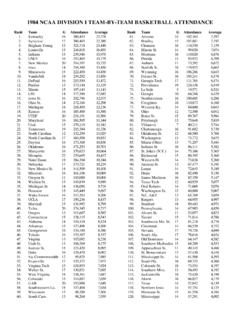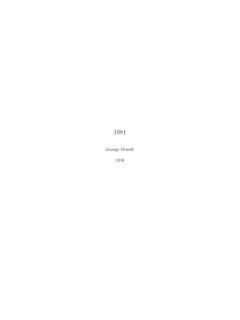Transcription of “1984” REVISITED: TOTALITARIANISM IN OUR CENTURY,
1 Word & World 4/1 (1984) REVIEWS Copyright 1984 by Word & World, Luther Seminary, St. Paul, MN. All rights 96 1984 revisited : TOTALITARIANISM IN OUR century , ed. by Irving Howe. NewYork: Harper & Row, 1983. Pp. x+ 276. $ (cloth); $ (paper).Who better to recall George Orwell in this way than Irving Howe? With his newestanthology, he returns to Orwell for at least the third time in his distinguished career, earlieraccounts having been rendered in Politics and the Novel (1949) and in a memorable review ofOrwell s Collected Essays, Letters and Journalism that first appeared in Harper s (January1969).
2 In his recent autobiography, A Margin of Hope (New York: Harcourt Brace Jovanovich,1982), Howe tells us how much he has been influenced, both as a critic and a citizen, by learn that he searched for his own prose voice, and a most lucid and compelling voice it is,with Orwell s exemplary prose in mind. And along with Edmund Wilson, Orwell became one ofthe critics whom Howe has most admired because they recognized, as Howe also has in his ownwork, the importance of literary criticism as a form of public discourse uniquely suited to ademocracy. But more than this, Orwell is for Howe among those few writers who are our crucialwitnesses, for having listened to the time in which we live as he did, for having been aware ofthe special terribleness of our century (349-350).
3 Some of the terribleness that Orwell captured in Nineteen Eighty-Four seems by now tohave been lost from view, as more than one contributor to this collection observes. But this is atribute to the vitality of Orwell s interpretation of our time, which is their 1949, for example, Howe characterized Nineteen Eighty-Four as a book that we wouldnot normally return to because it is unforgettable in its terrible details: we neither want to, nor dowe have to, reread it. By now, however, our experience with Orwell s story is different, becausewe have blandly accepted many of the things he warned us against.
4 We should be shocked, buthabitually are not, by the familiarity of what Orwell describes, for we have come a long wayin domesticating the idea of a total state (5).That the story no longer terrifies us is the point of departure for Mark Crispin Miller sintellectually dramatic essay, The Fate of 1984. The disappearance of Nineteen Eighty-Four,he says, beneath the ceaseless flood of brand-new atrocities supplied by our public life, shouldshow us that Orwell s vision is profoundly accurate: his novel very forces that havefinally vaporized it (20-21). But if today we no longer recognize the difference between theworld of Orwell s story and our own, this fact reflects a cardinal feature of life in his Oceana,where there are no differences, a most important refrain in the story, as Miller so keenly pointsout.
5 Thus the trivialization of Orwell s text in our day makes our world seem no differentfrom the world within the text (43).If we were to recover the differences about which Orwell cared, the ones that wouldenable us to be properly horrified by his story and otherwise to be discriminating about politics,we would first have to rescue our language from its present deplorable state. This is the subjectof Bernard Avishai s fine essay, Orwell and the English Language. He reminds us in variousways of how important a matter language is in Orwell s story, even concluding that ourpermanent interest in Orwell does derive from his elaborate despair over the corruption ofEnglish (71).
6 Were he alive today, of course, he would have even more reason to despair, for wehave not needed a Ministry of Truth to mangle words and destroy their meaning. Instead, wewitlessly do this in other ways, often with help from our jargon-laden disciplines and fromvarious institutions, among them schools, colleges, and universities, perhaps even 97It is a matter for regret that this stimulating anthology of Howe s is not also graced byJohn Wain s mature and rewarding essay, Dear George Orwell: A Personal Letter (TheAmerican Scholar, Winter 1982/83). But it is still a good collection, as it stands.
7 Most of itsessays, it should be noted, are not textual studies in any sense, some mentioning Orwell s storyitself only in passing or not at all. But each of them deals, in one way or another, as LeszekKolakowski does with particular distinction in TOTALITARIANISM and the Virtue of the Lie, withthe question that Orwell posed, of whether TOTALITARIANISM is not the distinctive contribution ofour century to the political history of the SchwandtSt. Olaf CollegeNorthfield, MinnesotaA HOME FOR THE HOMELESS: A SOCIOLOGICAL EXEGESIS OF I PETER, ITSSITUATION AND STRATEGY, by John Elliott.
8 Philadelphia: Fortress, 1981. Pp. 306. $ with the eyes of a sociologist looks over the landscape of early Christianityfrom a fresh vantage point. The new angle of vision takes in a larger panorama and revealshitherto unseen contours and dimensions, thus leading to a reassessment of the topography. Inrecent years, some Biblical scholars have adopted a sociological perspective on the socialorganization, the social forces, and the social world of meaning of early Christianity. The insightsresulting from this wide and illuminating point of view are a welcome advance in this innovative study of I Peter, John Elliott unites several sociological approaches intoa sociological exegesis in order to determine what the sociological circumstances of the textwere, why the text arose, and how it was meant to function in context.
9 Elliott claims a Petrinegroup in Rome wrote I Peter sometime between 73 and 92 (after Peter s death) to Christians inthe predominantly rural provinces of Asia Minor north and west of Taurus in order to encouragethem in the midst of conflict and at the same time to strengthen their own position of leadershipin the church at key to Elliott s sociological exegesis is twofold: he considers I Peter s languageabout aliens to be a reference to the social situation of the recipients, and he interprets household terminology in the letter to be part of the author s strategy in responding to thatsocial argues that I Peter s address to the readers as aliens and strangers (2:11) pointsnot to a cosmological exile of Christians from their heavenly home (as traditionally understood)but to the actual situation of the addressees in society displaced aliens and visiting strangers inAsia Minor who have become Christians.
10 In Roman society, aliens were politically and legallyinferior, economically deprived, and socially outcast. According to Elliott, it is this socialdisjuncture of aliens in relation to society (not Roman persecution) which accounts for thesuffering referred to in the letter. By virtue of their status, such aliens and visiting strangers werealready in conflict with society and needing a community. It is these people, Elliott argues, whohad come to make up the Christian sect which received this by the work of the Oxford sociologist Bryan Wilson, Elliott hypothesizes thefeatures of the conversionist Christian sect reflected in the letter: a familial-like community,voluntary and egalitarian, yet nonetheless demanding absolute allegiance, and separated fromordinary societal ties.


